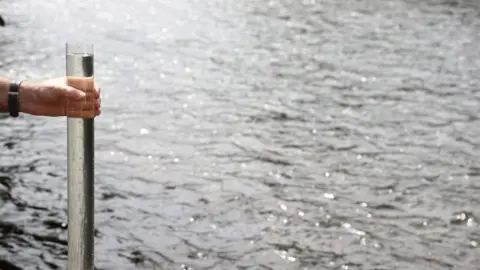Welsh Water fined £1.3m for 'negligent' monitoring
 Getty Images
Getty ImagesWelsh Water has been fined £1.35m for failing to properly monitor water quality at 300 different sites.
The company pleaded guilty to 15 charges relating to more than 800 offences in 2020 and 2021.
It blamed the failures on a reorganisation and the implementation of a new system at the same time as the Covid pandemic.
District judge Gwyn Jones concluded the company had been negligent and had "no doubt caused significant embarrassment to all those dedicated personnel in Dwr Cymru".
Since 2010, Dwr Cymru Welsh Water has been legally responsible for monitoring its water quality at its treatment plants and submitting its results to the regulator Natural Resources Wales (NRW).
Upon receiving its 2020 annual report, NRW officers said they were alarmed to find that the quality of the information provided had noticeably deteriorated compared to previous years, as 676 offences took place in 2020 with a further 142 breaches in 2021.
They all involved breaches of environmental permit licence due to samples not being taken in a timely way, or being incomplete or being submitted late or not at all.
This meant any potential harm to water quality, wildlife and other amenities would not have been known.
The locations included water treatment works at Bodedern, Llanfair PG, Pwllheli, Bethesda, Rhuddlan, Mold, Queensferry, Dyffryn Ardudwy, Elan Valley, Aberystwyth, Llandrindod Wells, Gowerton and Cardiff.
"Contingency plans should have been in place to ensure the company met their legal duty to comply with their permits while going through the restructure," NRW said.

The court heard that NRW had expressed their concerns to Welsh Water about the information the company was presenting, but on numerous occasions it had not received a response.
Welsh Water argued the number of offences accounted for a very small proportion of the total number of samples gathered during this time, the vast majority of which were recorded correctly.
It said it was now almost 100% compliant with its statutory obligations.
Judge Jones said there was no suggestion there was deliberate concealment of unlawful activity.
Welsh Water was a massive organisation, he said, and the offences had happened during the operationally difficult time of the Covid pandemic.
But there had been a lack of reporting which "undermined" the effectiveness and veracity of the self-reporting system.
"This was at a significant scale," said Judge Jones.
The new system of self-reporting introduced following internal reorganisation at Welsh Water had not been stress-tested, said Mr Jones, which led to "organisational failure".
Welsh Water was fined £90,000 for each of the 15 specimen charges to which it had pleaded guilty, totalling £1.35m.
The company was ordered to pay costs of £70,237.
A Welsh Water spokesperson said it had a "strong record of compliance" with monitoring obligations prior to and after 2020-21 but a combination of factors affected its work, including the pandemic.
"Despite this we met our monitoring requirements, which involve more than 18,000 tests per year, 98.95% of the time in 2020 and 99.45% in 2021," they said.
"The monitoring failures represent a very small number of examples in a programme involving tens of thousands of submissions each year."
No sites were left unmonitored during 2020-21, they said, and there was "no identified" environmental harm but they recognised compliance fell short.
"Welsh Water will continue to work closely with our regulators to ensure that we deliver on our two main priorities, the best possible service to our customers and protecting the environment," they added.
